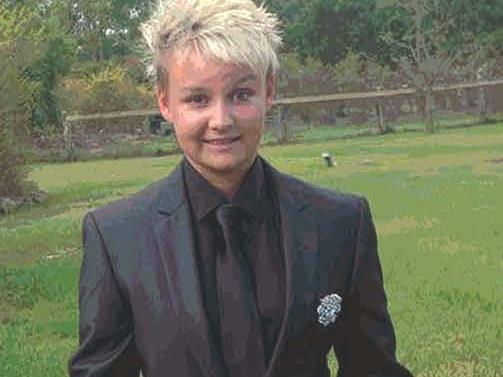Yolanda Bogert’s How I Met My Son a mother’s loving memoir
Two years after announcing her daughter’s transformation to manhood, Yolanda Bogert has written about the experience.

At first glance, red flags abound: a mother writing a book that’s largely about her 19-year-old son? An author with no previous publishing experience, though — for what it’s worth — she owned a second-hand bookshop in a small Queensland town? Such scepticism is healthy, for the publishing industry hungers for rush-released memoirs about topical matters. This, then, could easily have fallen into that predictable trap, resulting in a forgettable book soon to end up on the discount table.
To the author’s credit, this is not that kind of book, for she is not that kind of writer. Scrappy and misshapen though this manuscript undoubtedly is, the overarching story suits the family in question. The story’s genesis is rooted in a minor pop cultural phenomenon. There it is, right on the cover: a small but powerful newspaper “retraction’’ that the author placed in the births section of The Courier-Mail in December 2014 to announce that her teenage daughter, Elizabeth, was in fact her son Kai.
Yolanda Bogert fell pregnant at the age of 15 following an unhappy and rebellious childhood. She gave birth to Elizabeth in 1995 and muddled through as best she could, trying to push against the stigma of being dependent on government benefits. “What I understood even less was how I had somehow created my identity already,” she writes of this period. “Mother, breeder, domestic. That everything I would do from then on would be relative to my children. Every achievement and every flaw, seen through a ‘teen parent’ lens which seemed to both diminish and magnify, depending on who was looking and what they were looking at.”
When a son named Myk’l followed Elizabeth (who would later become Kai), Bogert’s situation became even more strained. Her children — or “sproggets”, as she affectionately calls them throughout — noticed her financial stress despite her best efforts to hide it. This meant that they, in turn, learned to hide their own needs, believing themselves to be a burden on the parent. These tough early years of their lives are well-illustrated, and it is rare to hear such stories articulated so well. Though Bogert’s formal schooling ended early, she remained a firm believer in self-education through reading books, which pays off in the telling here.
The narrative broadly follows a chronological arc from Kai’s birth through to the family’s sudden fame after the 2014 newspaper ad resulted in international media attention. Interspersed throughout are jolts to the present, often exhibited in text message conversations between the author and her son. While jarring, these interludes are worthy in their own right, for they show how she and her son communicate outside of the memoir form.
Bogert is honest about her struggles with this task, however, and for good reason. “How do you take a snapshot of your family and your relationships and your children and immortalise them in literature?” she wonders in a letter to a friend that concludes the second chapter. Smartly, she hands the pen to Kai at key moments, most notably in the second half, when his transition becomes the focus.
These are some of the book’s best moments. “School felt like a war zone to me,” he writes. “I hid being transgender at school because I could see how hard it was just to be Beth there. Kai would probably have withered and died, or reached critical mass and exploded.” Images such as these are particularly potent considering the high rates of suicide among transgender people, as well as the fact that the author’s father died by his own hand in 1988, an event that she admits triggered her post-traumatic stress disorder, depression and anxiety.
Bogert also frets about reducing herself and her family to two-dimensional characters used to represent an issue or a cause, rather than being read as fully-formed, complex people. She writes of being sceptical that her publisher was attempting to cash in on a perceived trans cachet: “It’s been important to all of us that Kai’s story is told as he wants it told, even though he didn’t want to write it himself, and he’s had control over what is said and how.”
This darker second half is better executed than what came before, and it’s the latter chapters from which parents in similar situations will gain the most insight. While every transition story is different, there are familiar themes. Bogert is blazingly honest about how she could have better handled Kai’s coming out, to the point of wondering whether she should have published the newspaper retraction that led to this book.
In sum, many good things have come from Bogert’s short, public message to her son, who has been largely fine with it all along. “If our story helps other trans kids to feel less alone, or helps other parents to understand their own sprog better and maybe facilitates acceptance for them, then he is happy,” she writes near the end of this messy but commendable story. As for Kai? “Eventually it all died down and now I’m just a page on the transgender wiki,” he writes. “I’m cool with that.”
Andrew McMillen is a Brisbane-based freelance journalist. His second book will be published in August.
How I Met My Son: A Story of Love That Transcends Gender
By Yolanda Bogert
Affirm Press, 238pp, $24.99



